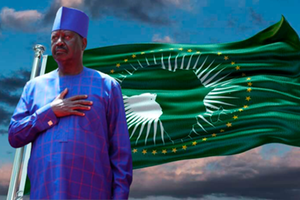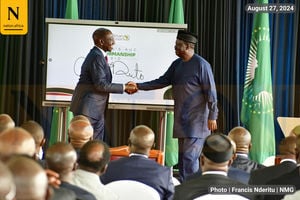
President William Ruto (second left) hold talks with President Hakainde Hichilema (left) of Zambia, Former Prime Minister Raila Odinga (second right) and Foreign Affairs Cabinet Secretary Musalia Mudavadi on the sidelines of the Forum on China-Africa Cooperation Summit in Beijing.
At the height of anti-government protests early in 2023, President William Ruto pulled a first one on opposition leader Raila Odinga who had refused to recognise his presidency.
Mr Odinga was at the time also serving as the African Union High Representative for Infrastructure Development, a post he had been appointed to in 2018 following a truce with President Uhuru Kenyatta to end a political crisis that followed the 2017 elections.
For the Kenya Kwanza administration, Mr Odinga did not deserve to be sitting at the African Union (AU) docket, a position he had secured courtesy of the Kenya government, which he was now leading protests against.
Officials of the new administration cited the folly of Mr Odinga instigating internal turmoil yet his office bills were being footed by the country’s budget - Kenya is among main funders of the continental body.
Indeed, one cannot run with the hare and hunt with the hounds, officials of the newly-elected government argued.
As such President Ruto started a series of diplomatic interventions that eventually resulted in Mr Odinga’s unceremonious ouster from the AU position.
On one hand, Mr Odinga said he had quit his role at the continental body but this assertion came a little too late because the Foreign Affairs Principal Secretary, Fred Sing’oei had already made public the letter showing the Opposition chief’s dismissal via his official X (formerly Twitter) account.
“End of tenure notification. We thank Raila Odinga for his service to the continental body,” PS Sing’oei wrote on his X timeline on February 23, 2024 and shared the letter drafted by the AU Chairperson, Moussa Faki.
In the letter dated February 19, 2023, Mr Faki commended the former Kenyan Prime Minister saying he had exhibited exceptional leadership during his tenure as a special envoy.
"Your role in this journey, excellency, has been invaluable. Allow me to express my profound gratitude for accepting to serve in this role during the transition period, which has now come to a happy conclusion," added the AU boss," Faki said.
A Kenyan Cabinet Secretary who was at Addis Ababa at the time told of the Kenya Kwanza's government hand in Raila's ouster from the continental seat.
“The AU has sanctioned nations that do not support democracy and people who try to create instability in stable African nations. The AU is tired of despondent leaders who want to create instability. Raila has said he doesn’t recognise President Ruto and these demonstrations are the same as people trying to overthrow a democratically elected government. He cannot continue to work at the AU yet he does not espouse the principles of the AU,” said the CS.
Fast forward a year later, yet again at the thick of protests led by the Gen Zs, the Kenya Kwanza regime still battling for its legitimacy from a hostile electorate just as it was during last year’s protests, was forced to look for one to salvage the situation, and who best, if not Mr Odinga.
Sensing that the dynamite he once was seemed to be fizzling out and the struggle of his administration’s legitimacy being constantly threatened by the angry voters and the opposition, President Ruto who engineered Raila’s exit from the AU infrastructure post changed tact.
To prove he is still the man of refreshing candour that he had been barely two years ago when he was euphorically elected to power, the Head of State has morphed to be the chief campaigner of Mr Odinga’s bid. He is now pleading with African countries to vote in his erstwhile sworn political nemesis as the next AU Chairperson.
A coterie of his allies, previously using their skill of demagoguery to stir revulsion against the former premier and stir admiration for the Kenya Kwanza regime, soon followed suit.
Though at first hesitant in welcoming the scion of opposition politics in Kenya, several MPs elected to office via the ruling party eventually succumbed to the allure of power offered by being on the right side with the President and began singing praises for Mr Odinga.
Just a few days after the ODM party chief announced his candidacy for the AU job several Kenya Kwanza legislators led by the National Assembly Majority Leader, Kimani Ichungwah, said they would back Mr Odinga, adding that he is an African statesman.
“Whenever any Kenyan is nominated for or applies for a job anywhere in the world, we as Kenyans are obligated to support him. He is not there as ODM leader but as a Kenyan and we support his bid,” he said.
Exactly six days later, photos of President Ruto with Mr Odinga on foreign soil holding sticks and herding the typical large-horned Ugandan cows alongside Uganda’s strongman, Yoweri Museveni, sparked heated debate.
This interaction, that has now become to be known as “cow diplomacy” did much to lessen the simmering tension between Kenya and Uganda over the stalemate that saw Uganda National Oil Company being denied access to Kenya’s pipeline. Mr Odinga was the middleman who brokered the deal that turned out quite successful.

Azimio la Umoja leader Raila Odinga (left) and Prime Cabinet Secretary Musalia Mudavadi during a press briefing in Nairobi on June 5, 2024.
Also, this meeting saw the Kenyan deputation win Mr Museveni’s support for Odinga’s candidacy for the top continental job.
“Crucially, at the insistence of President Museveni, we also discussed my candidature for the chairmanship of the African Union Commission. I am very grateful to President Museveni for strongly endorsing my candidacy and to President Ruto for fully supporting it,” the ODM boss said.
So serious is President Ruto’s will to have the Kenyan candidate at the top seat that Mr Odinga admitted that he was pleasantly surprised by the unwavering support shown to him by the government.
This, he said during a joint press briefing with the Prime Cabinet Secretary and Cabinet Secretary for Foreign and Diaspora Affairs, Musalia Mudavadi - a move showing just how the Opposition Chief is now enjoying the privileges offered by the inner sanctums of power- some two months ago.
“I was pleasantly surprised that the Kenyan government said they will support me. I expected them to say no. I do not know the reason why they said yes, that was their own decision, not mine,” he said.
On his part, PCS Mudavadi, the only Kenyan to serve a sthe Cabinet Secretary for all ministries when President Ruto dissolved the cabinet, said that Kenya decided to support Mr Odinga because he is equal to the task.
He then went on and announced the establishment of a campaign secretariat run by the State Department for Foreign Affairs that will assist the candidate in preparation for the election slated for February 2025.

Come August 27, 2024, President Ruto, in an event attended by East African presidents at State House, endorsed Mr Odinga’s candidacy and described him as a veteran mobiliser for positive change who has the ability to lead the AUC.
Mr Odinga’s bid for the position, President Ruto said, represents Eastern Africa’s readiness to contribute to AU leadership through the principle of inter-regional rotation.
“Raila is a celebrated statesman whose longevity in leadership has been sustained by an unrelenting devotion to democratic change as the foundation of sustainable freedom and prosperity,” he said.
Regional leaders present during this unveiling ceremony included President Museveni, Samia Suluhu (Tanzania)and Salva Kiir(South Sudan). Rwanda’s Paul Kagame was represented by his Foreign Affairs Minister, James Kadarebe with Burundi being represented by its Prime Minister, Gervais Ndirakobuca.
Former Presidents, Jakaya Kikwete (Tanzania) and Olesegun Obasanjo (Nigeria) also graced the occasion.
Mr Odinga somehow managed to get himself to the corridors of power yet again despite Deputy President, Rigathi Gachagua’s famous words uttered shortly after their victory in the 2022 general elections where he said he had “set multiple traps” at State House to ensure the Opposition boss does not wiggle his way back to the House on the Hill.
A week after Kenya unveiling Odinga’s bid, Dr Ruto tagged along Mr Odinga to the recently concluded China-Africa Summit held in Beijing last week where the duo held several meetings with at least seven African Presidents. These Heads of States included Mr Kagame (Rwanda), Hakainde Hichilema (Malawi), Faure Gnassingbé (Togo), Assimi Goïta (Mali), Umaro Sissoco Embaló (Guinea Bissau) and Mahamat Idriss Déby (Chad).
However, this fierce support by the State of Mr Odinga’s candidacy has split the Azimio la Umoja coalition with other principals of the Opposition outfit distancing itself from the former Premier saying he has betrayed their course of demanding better governance and democracy in the country.
This alternative view to the government’s move to support the Opposition stalwart was effectively brushed off when President Ruto announced plans for a “broad-based political arrangement” in July shortly after dissolving his cabinet.
A week after his announcement, the President read a list of new nominees for the cabinet slots and true to his words, four politicos from Odinga’s camp were given a chance to dip their fingers in the thick broth that comes with being a Cabinet Secretary.
Currently, Mr Odinga’s bid for the AUC job faces stiff competition from Djibouti’s candidate, Mahmoud Ali Youssef who just two days after Raila secured the backing of East Africa Community, got the backing of the Organization of Islamic Cooperation (OIC).
University of Witwatersrand International Relations and Diplomacy professor Gilbert Khadiagala is of the opinion that Kenya might not enjoy the support of the Southern African countries including South Africa and Zimbabwe.
This, he told the Nation in an interview, was due to President Ruto’s “abandonment of Kenya’s global neutrality in favour of an ambiguous non Nato membership that hurt Kenya’s reputation in Africa, particularly for Southern African countries that are often closeted, but rabid-anti American nations”.
For the Center on International Cooperation Executive Director, Martin Kimani, Kenya must invest considerable resources for Mr Odinga to secure the seat.
“Raila’s chances are good, he is a strong candidate and he has the government behind him. But he is going to compete for the position. Djibouti Foreign Affairs Minister (Youssef) is probably his strongest rival. Raila has an equally good chance of missing the job because Mr Youssef comes with a lot of experience and strong endorsements from regional organisations,” Mr Kimani, who is also Kenya’s former permanent representative to the United Nations, said.









